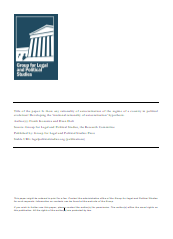Constitutional Rigidity: Where Does It Lead To?
Constitutional Rigidity: Where Does It Lead To?
Author(s): Dren Doli, Fisnik Korenica
Subject(s): Constitutional Law, Governance, Government/Political systems
Published by: Group for Legal and Political Studies
Keywords: Constitutional flexibility; Constitutional rigidity; Amending procedure; Amending by parliament; Amending by referendum; Interests’ inclusiveness; Rule of majority; Unitary and federal countries; Constitution’s highness in the system of legal norms;
Summary/Abstract: The changing of constitutional provisions, through amendments, is an important process which determines whether a constitution is rigid or flexible. Constitutional rigidity itself is a very important attribute of the constitution, given that it shows the difficultness of a constitutional amending. Based in that, this paper is aimed at discussing the constitutional rigidity, while surveying the amendment procedure on some of the western constitutions. By doing so, the paper shows some of the factors that might lead to constitutional rigidity; meanwhile the paper addresses some relevant processes that have been subject to constitutional rigidity. Following that, the paper discusses the concept of the constitutional rigidity outcomes, thus building a hypothesis on the situations that the latter leads to. Finally, the paper makes a test upon the hypothesis with a small-N of cases – therefore the hypothesis produced will be a small-N tested hypothesis.
Series: Group for Legal and Political Studies - Academic Papers
- Page Count: 17
- Publication Year: 2009
- Language: English
- Content File-PDF

